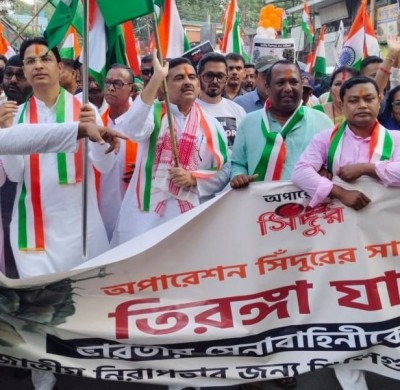
India combats Pakistan's new centralised terror export module in Jammu & Kashmir and beyond
The Indian security forces in Jammu and Kashmir (J&K) are now fighting Pakistan's centralised control and command to export terrorists as the region braces for a series of events and a vibrant tourist season.
Sources in the security forces said there have been reports of Pak-controlled terrorist movement in different areas of Jammu and Kashmir, mainly in Poonch and Rajouri, almost daily.
Citing top-level officials deployed in J&K, News18 reported that Pakistan has been trying to push terrorists from launch pads since the third week of April, although there is no official data on infiltration this year.
“The weather is one factor that provides favourable conditions for infiltration, but it is the pressure that is forcing terror groups to target anyone, including tourists," a senior official was quoted as saying by the news channel.
"Unlike in the previous years, terrorists have targeted tourists, which shows the desperation of terror outfits to demonstrate their efforts to their masters in spreading terror in J&K,” the official added.
Officials involved in intelligence gathering in J&K said that there has been a change in the terrorist infiltration process as the Pak-controlled terror-related movements are getting centralised due to the multiple events scheduled in the union territory.
As per officials, terror handlers in Pakistan, who used to send terrorists during infiltration-prone seasons, have shifted focus from Kashmir area to Poonch and Rajouri in Jammu due to changes in J&K, and they are also instructing the launch pad operators not to send terrorists independently to avoid getting eliminated by security forces.
According to reports, everything related to Pakistan's terrorist export is now centralised, and the actual masters decide everything resulting in low infiltration.
Besides changes in infiltration method and routes, a shift in the target of terrorists has also been noticed in J&K as a former sarpanch was killed and a tourist couple from Rajasthan was injured in two separate firing incidents by militants recently. They prove that security forces are not their only targets.
Not only in J&K, Pakistani handlers, using their centralised terror model, are plotting attacks in other states of India as well and they are pushing terrorists through completely different routes.
Recently, four suspected ISIS terrorists -- all Sri Lankans, who were arrested from Ahmedabad airport by the Gujarat Anti Terrorist Squad (ATS)- told the investigators that their Pakistan-based handler was going to give them the exact location and time to carry out the attack after collecting the weapons dropped for them in the city.
They reached Ahmedabad from Colombo via Chennai. They took flight and travelled along with other passengers.
Officials in the intelligence unit said they are tracking all possible routes using which Pakistan can export terrorists to India.
This is not the first time terrorists are being pushed into India through a non-Kashmir route -- the 2008 Mumbai attack (26/11) is one of the biggest examples of this.
Unlike exporting terrorists from Pakistan Occupied Kashmir (PoK)'s launch pads, 10 highly trained and heavily armed Lashkar-e-Taiba (LeT) terrorists were exported to India from Karachi via sea route to carry out India's one of the deadliest terrorist attacks.
According to a column published by Homeland Security Today magazine, Pakistan has been becoming a new safe haven for ISIS and Al-Qaeda along with its homegrown terror groups.
The magazine wrote in the editorial, citing Global Terrorism and Trends Analysis Center (GTTAC) Records of Incidents Database (GRID), that since the Taliban’s takeover of Afghanistan, the number of terrorist attacks more than doubled in Pakistan itself, rising from 320 attacks in 2021 to 695 in 2023.
Pakistan is itself paying the price of its material and moral support to radical groups and terrorists while continuing with its nefarious plans on India.
As per GRID records, 25 terror organizations carried out as many as 2,344 terrorist attacks from 2018 to 2023 in Pakistan.
According to the column, the operational capacities of ISIS and Al Qaeda affiliates in the South Asian nation rings bells not only for Pakistan but for regional and global security as the current radicalization trends bring more recruits to these terror groups and pave the way for the emergence of new jihadist organizations in Pakistan, which has been included in the Financial Action Task Force (FATF) greylist many times for its financial support to terrorist activities.
Support Our Journalism
We cannot do without you.. your contribution supports unbiased journalism
IBNS is not driven by any ism- not wokeism, not racism, not skewed secularism, not hyper right-wing or left liberal ideals, nor by any hardline religious beliefs or hyper nationalism. We want to serve you good old objective news, as they are. We do not judge or preach. We let people decide for themselves. We only try to present factual and well-sourced news.







